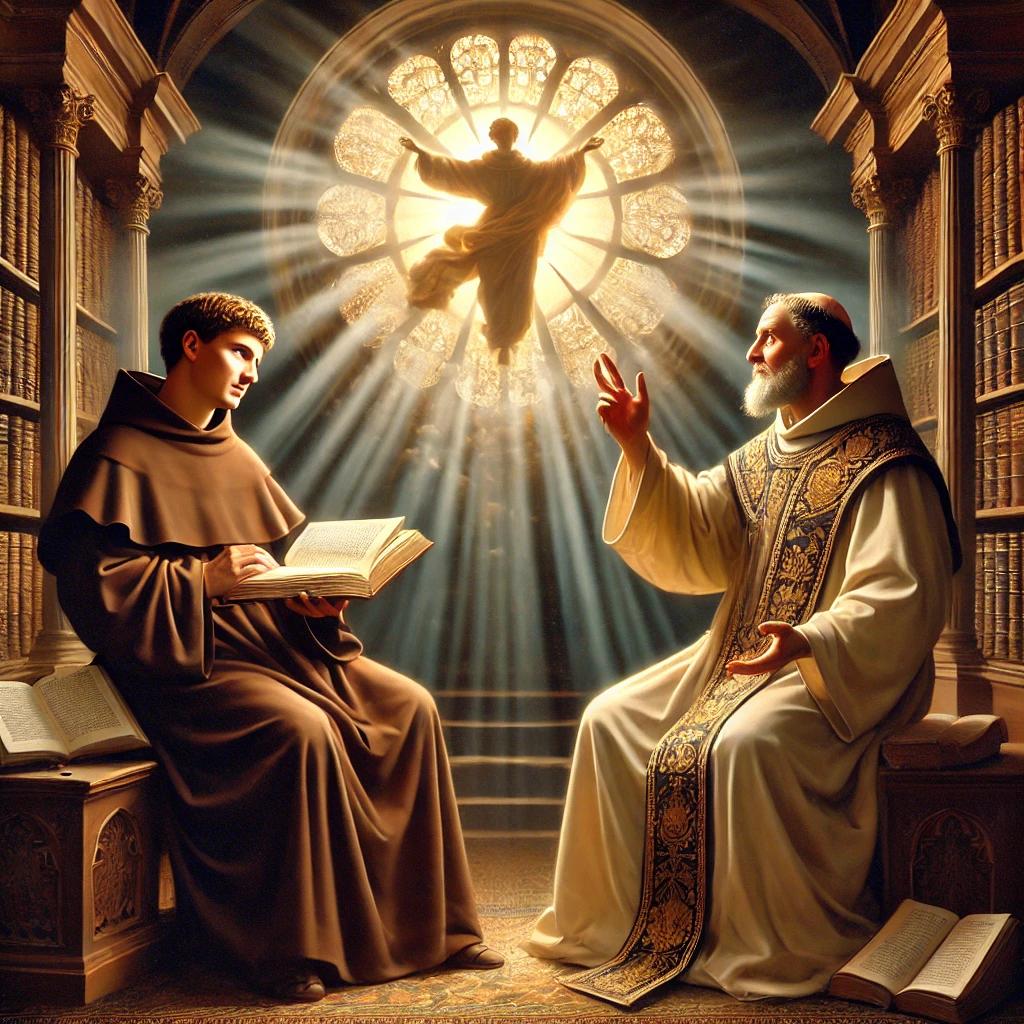In the rich tapestry of Catholic theology, the understanding of the soul’s connection to God has been a subject of profound reflection and discourse. Two monumental figures, St. Thomas Aquinas and John Duns Scotus, offer us differing views on this mystical relationship. Their theological positions on the soul’s illumination by divine light reveal unique insights into the nature of humanity, the dignity of creation, and our intimate relationship with God.
Aquinas: Souls as Reflectors of Divine Light
St. Thomas Aquinas, one of the greatest theologians in Christian history, developed a systematic theology that viewed creation, including the human soul, as deeply dependent on God. His perspective is beautifully captured in the metaphor of the soul as a window or a mirror. In Aquinas’ view, our souls do not possess their own divine light; rather, they serve as transparent mediums through which the light of God shines.
Imagine sunlight pouring through a stained-glass window. The beauty of the colors, the radiance that fills the room, all depend on the sun’s illumination. Similarly, for Aquinas, the divine light—God’s grace—illuminates our souls, allowing us to participate in the divine nature. Without this light, our souls remain dark and powerless. We become reflections of God’s glory only through His continuous action and grace. Aquinas emphasizes our utter dependence on God for all goodness, truth, and beauty that we manifest.
This vision underscores humility: human beings must recognize that any virtue, holiness, or wisdom they exhibit is a gift from God, not something intrinsic to their own nature. As Aquinas writes in his Summa Theologica, “All creatures participate in the divine goodness, and it is through this participation that they are good and capable of good acts.” Our goodness is a reflection, an echo of God’s goodness, given to us but not generated from within us.
Scotus: Souls as Lamps of Divine Light
Enter John Duns Scotus, a scholastic theologian who brought a different, yet complementary, vision to the theological table. Scotus emphasized the immanent dignity of all creation, particularly the human soul. He used the metaphor of the soul as a lamp that possesses its own inner light, gifted by God. For Scotus, creation is not merely a passive reflector but an active bearer of divine sanctity.
Imagine a room lit by a beautiful lamp, with the light radiating outward from within. This is how Scotus envisioned the soul: already infused with the divine presence. The inner light of our being comes from God and is an intrinsic gift that cannot be diminished or taken away. In this view, God has imbued every soul with a sanctity and worth that transcends our comprehension. Each being, from the greatest angel to the smallest creature, has an inherent dignity because God has freely and lovingly granted it a share in His divine essence.
Scotus’ theology emphasizes the unique worth of every human being. Our souls are not empty vessels waiting to be filled; they are already sanctified and radiant, a truth that should inspire awe and reverence for all of creation. This view fosters a sense of gratitude and amazement at the Creator’s generosity and an appreciation of the innate beauty present in every soul.
Theological Implications: Dependency vs. Immanence
Both Aquinas and Scotus highlight important truths about the human condition and our relationship with God. Aquinas’ emphasis on the soul as a mirror of divine light stresses our dependency on God. It reminds us that any goodness we exhibit is derived from God’s grace and not our own merit. This view encourages humility, recognizing that our spiritual life is sustained moment by moment by divine grace.
Scotus, however, invites us to ponder the immanence of God within us. His vision fosters a profound appreciation for the inherent sanctity of each person, emphasizing that our dignity is rooted in our very being. This view can lead to a deeper respect for all creation, inspiring a recognition of the sacred in everyday life.
The Meeting Point: Grace and Dignity
Despite their differences, both theologians converge on one essential truth: our souls are profoundly connected to God. For Aquinas, this connection is external and reflective, while for Scotus, it is internal and radiant. Both perspectives offer a rich spirituality that can inform how we see ourselves and others.
Aquinas reminds us to remain humble and grateful, never forgetting our need for God’s continuous grace. Scotus calls us to honor the divine presence within us and all of creation, treating every soul as a bearer of God’s light. Together, these views create a balanced spirituality that celebrates both the divine gift of grace and the inherent dignity bestowed upon us by our Creator.
Living in the Light
As Catholics, we are invited to live in this paradox: to humbly reflect God’s light while recognizing the divine flame already within us. We can draw inspiration from the teachings of both Aquinas and Scotus, knowing that our souls are both receivers and bearers of divine glory. This understanding can transform the way we view ourselves, others, and the entire created world.
St. Josemaria Escriva beautifully captures this synthesis when he writes, “Remember that you are in the presence of God: your very being reflects His love, and yet, His love is what sustains you. Walk in humility, but let your heart be filled with the fire of divine love.” May we, too, walk in this light, embracing our dependency on God while cherishing the sacred dignity He has implanted within us.
In the end, both metaphors—the mirror and the lamp—lead us to the same divine mystery: a God who loves us so deeply that He chooses to dwell among us and within us. May this truth inspire us to reflect His light and radiate His love to the world.
